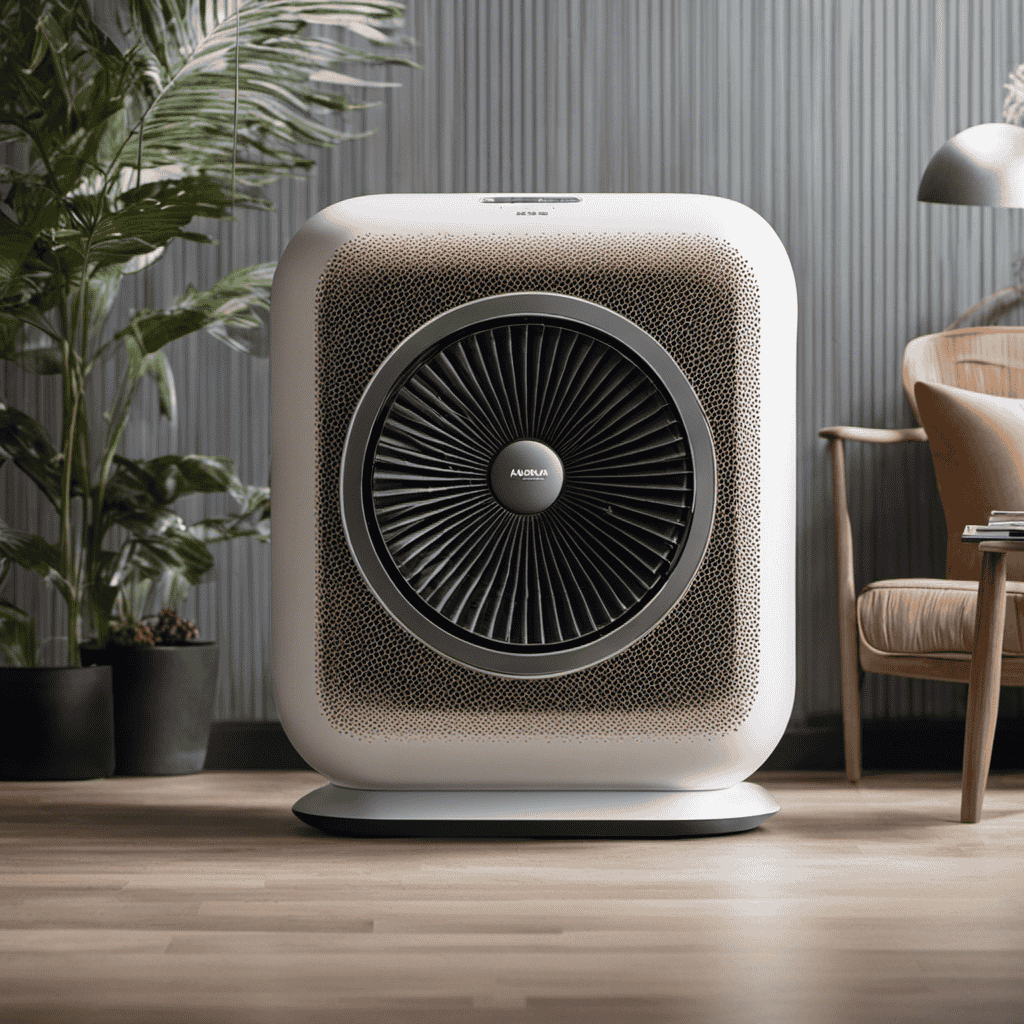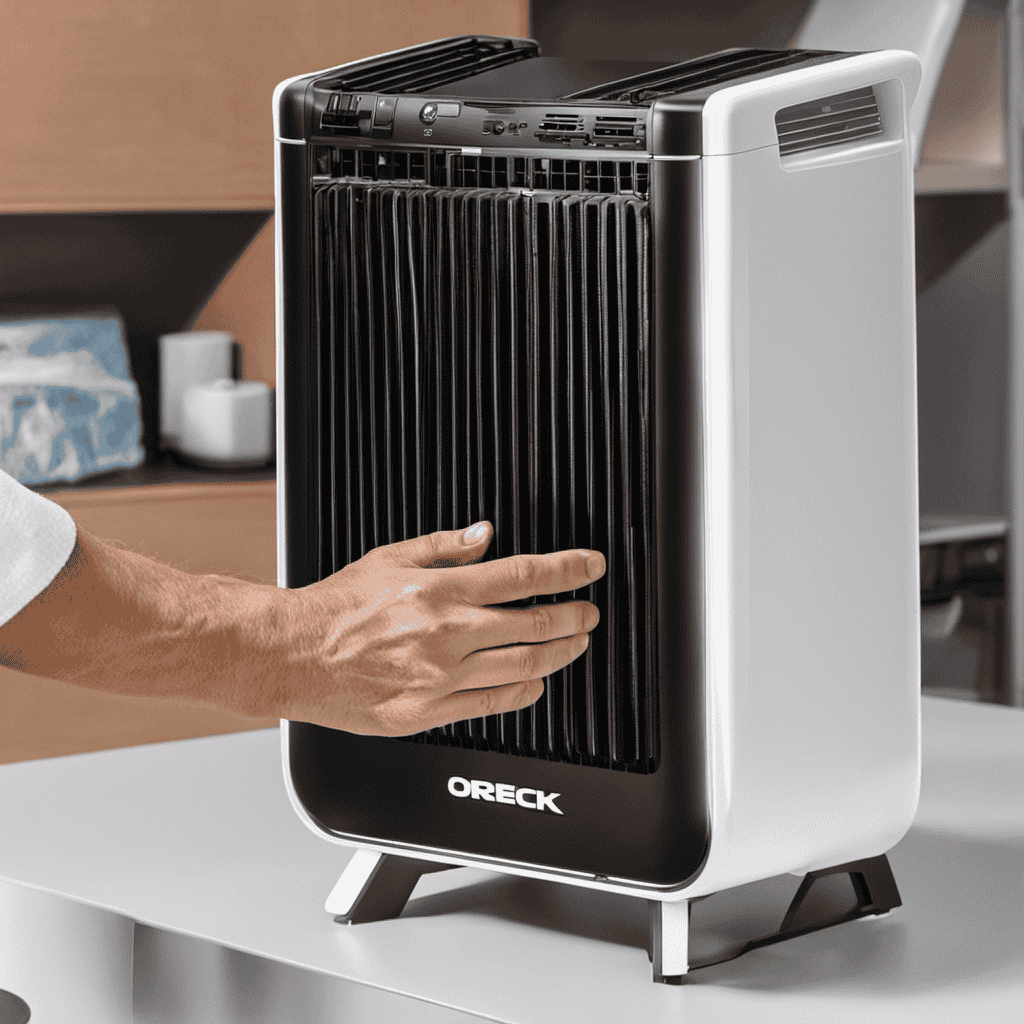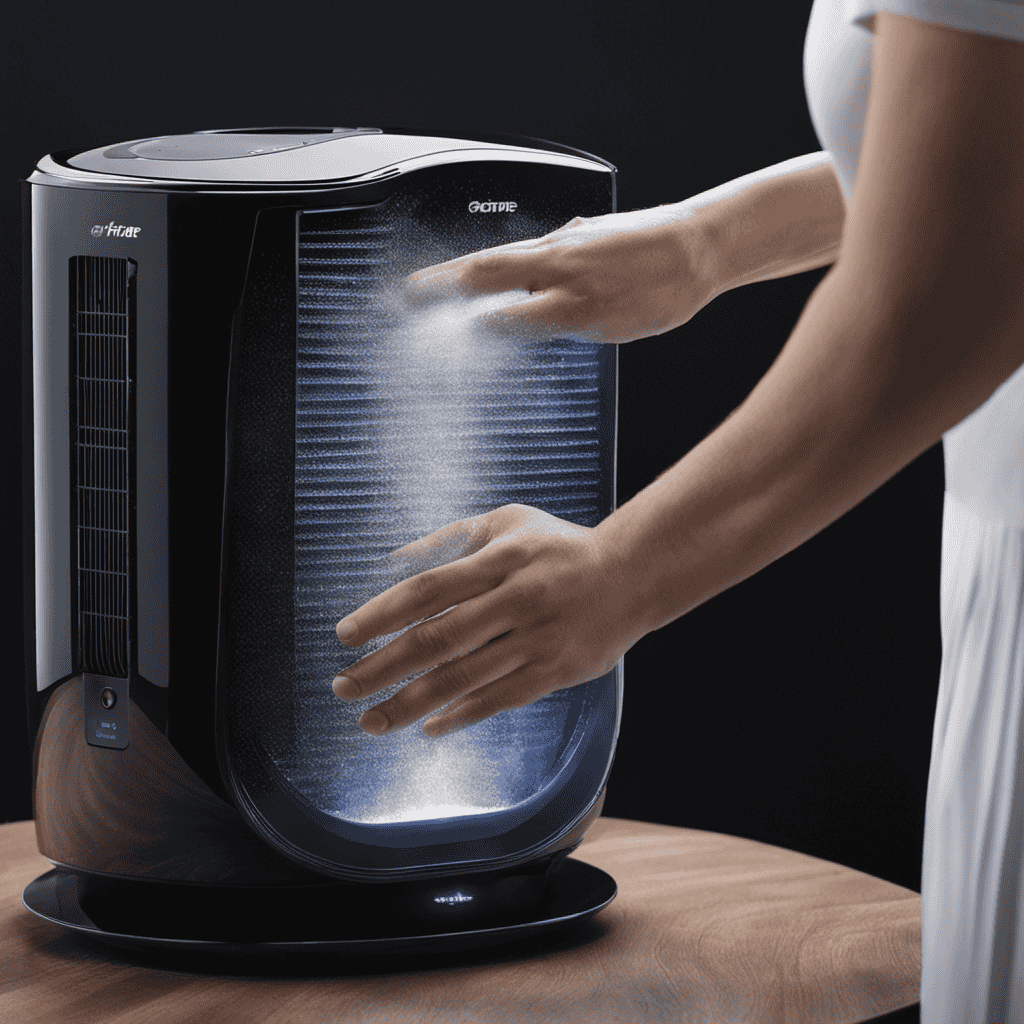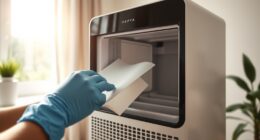I must admit, everyone, I’m thoroughly impressed by the effectiveness of HEPA filters in air purifiers. They genuinely do a remarkable job at enhancing the quality of indoor air.
So, what exactly does a HEPA filter do? Well, let me break it down for you. A HEPA filter, short for High Efficiency Particulate Air filter, is designed to capture tiny particles like dust, pollen, pet dander, and even harmful pollutants.
In this article, we’ll dive deep into how these filters work, the benefits they bring, and what to consider when choosing one. Buckle up, because we’re about to get technical!
Key Takeaways
- HEPA filters in air purifiers capture tiny particles like dust, pollen, pet dander, and pollutants.
- They use a dense mesh of fibers to trap particles as air passes through it.
- HEPA filters are highly efficient in removing particles as small as 0.3 microns.
- Using HEPA filters in air purifiers greatly improves indoor air quality.
How Does a HEPA Filter Work in an Air Purifier
The HEPA filter in an air purifier is an essential component that effectively traps and removes small particles in the air. This includes common allergens like dust, pollen, and pet dander. The filter operates by using a dense mesh of fibers to capture these particles as the air passes through it.
One of the advantages of a HEPA filter is its high level of efficiency in removing particles as small as 0.3 microns, which can greatly improve indoor air quality. Additionally, HEPA filters are known for their durability and long lifespan, making them a cost-effective solution for air purification.
However, there are also some disadvantages to consider. HEPA filters can be more expensive compared to other types of filters, and they require regular replacement to maintain their effectiveness. Furthermore, the dense nature of the filter can restrict airflow, potentially reducing the overall performance of the air purifier.
Benefits of Using a HEPA Filter in an Air Purifier
One of the benefits of using a HEPA filter in an air purifier is that it helps to remove allergens and pollutants from the air. This is achieved through the filter’s ability to capture particles as small as 0.3 microns with an efficiency of 99.97%.
In addition to allergens, HEPA filters also remove dust, pet dander, mold spores, and even some bacteria and viruses.
HEPA filters are cost effective in the long run, as they can last up to 12 months before needing replacement, depending on usage.
Using a HEPA filter in an air purifier can greatly reduce the risk of allergies and respiratory issues caused by airborne particles.
HEPA filters are highly efficient at trapping particles, making them an effective tool in preventing allergies.
Factors to Consider When Choosing a HEPA Filter for an Air Purifier
When choosing a HEPA filter for an air purifier, it’s important to consider factors such as filtration efficiency and replacement frequency. Efficiency ratings play a crucial role in determining the effectiveness of a HEPA filter. The higher the efficiency rating, the better the filter is at capturing airborne particles. It is recommended to choose a filter with a rating of at least 99.97% efficiency. Additionally, the replacement frequency of the filter should be taken into account. Some filters may need to be replaced more frequently than others, depending on factors like air quality and usage. To help you make an informed decision, here is a table summarizing the efficiency ratings and recommended replacement frequencies of different HEPA filters:
| HEPA Filter Model | Efficiency Rating | Replacement Frequency |
|---|---|---|
| Model A | 99.97% | Every 6 months |
| Model B | 99.99% | Every 12 months |
| Model C | 99.95% | Every 9 months |
| Model D | 99.98% | Every 6 months |
| Model E | 99.96% | Every 9 months |
Considering these factors will ensure that you choose a HEPA filter that provides optimal air purification. Now, let’s move on to the next section, which discusses the maintenance and replacement of HEPA filters in air purifiers.
Maintenance and Replacement of HEPA Filters in Air Purifiers
To keep your air purifier operating effectively, it’s essential to regularly maintain and replace the HEPA filters. Proper maintenance ensures that the filters continue to capture and remove airborne particles, allergens, and pollutants from your indoor air.
Here are some maintenance tips to help you get the most out of your air purifier:
- Clean the pre-filter regularly to remove larger particles and extend the life of the HEPA filter.
- Replace the HEPA filter according to the manufacturer’s recommendations, usually every 6 to 12 months.
- Consider purchasing a vacuum cleaner with a HEPA filter to clean the area around the air purifier and prevent dust buildup.
When it comes to the cost of replacement filters, prices can vary depending on the brand and model of your air purifier. It’s important to factor in the cost of replacement filters when purchasing an air purifier to ensure that you can afford to maintain its effectiveness over time.
Comparing HEPA Filters to Other Types of Air Purification Technologies
If you want cleaner indoor air, you should compare HEPA filters to other types of air purification technologies.
HEPA filters, or High Efficiency Particulate Air filters, are known for their effectiveness in removing allergens and other airborne particles from the air. One of the advantages of using HEPA filters in homes is their ability to capture particles as small as 0.3 microns with an efficiency rate of 99.97%.
This means that HEPA filters can effectively trap dust, pet dander, pollen, mold spores, and even bacteria and viruses. Compared to other air purification technologies such as activated carbon filters or ionizers, HEPA filters provide superior filtration and are highly recommended for individuals with allergies or respiratory conditions.
Frequently Asked Questions
What Is the Cost of a HEPA Filter for an Air Purifier?
The cost of a HEPA filter for an air purifier varies depending on the brand and size. However, it is important to consider the effectiveness of the filter in removing allergens and pollutants from the air.
Can a HEPA Filter Remove Cigarette Smoke and Odors From the Air?
Yes, a HEPA filter can efficiently remove cigarette smoke and odors from the air. It traps tiny particles and harmful substances, ensuring cleaner and fresher air. It’s a breath of fresh air for your lungs.
How Often Should a HEPA Filter Be Replaced in an Air Purifier?
In an air purifier, the Hepa filter plays a crucial role in improving indoor air quality. It efficiently captures tiny particles, such as dust, pollen, and pet dander, ensuring cleaner and healthier air. However, it is essential to replace the Hepa filter regularly to maintain its effectiveness.
Can a HEPA Filter Help With Allergies and Asthma?
A Hepa filter in an air purifier can provide allergy relief and improve respiratory health. It effectively captures tiny particles like pollen and dust mites, reducing allergens in the air and helping to alleviate symptoms of allergies and asthma.
Are There Any Potential Health Risks Associated With Using a HEPA Filter in an Air Purifier?
There are potential side effects and long-term impacts associated with using a HEPA filter in an air purifier. It is important to understand these health risks before considering the use of such a device.
Conclusion
In conclusion, the HEPA filter is a crucial component of an air purifier. It effectively captures and removes microscopic particles from the air we breathe. Its intricate design and high efficiency make it the go-to choice for those seeking cleaner and healthier indoor environments.
However, as we delve deeper into the world of air purification technologies, it becomes clear that the HEPA filter is just one piece of the puzzle. By exploring and comparing other types of filters, we can uncover even more advanced and effective solutions for improving our indoor air quality.
Stay tuned for more exciting developments in the field of air purification.










